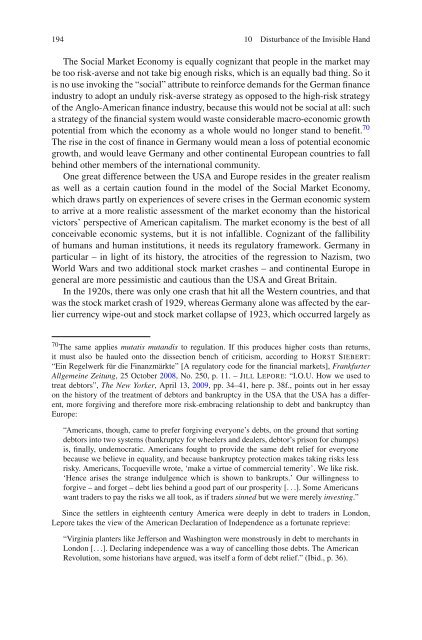The Ethics of Banking: Conclusions from the Financial Crisis (Issues ...
The Ethics of Banking: Conclusions from the Financial Crisis (Issues ...
The Ethics of Banking: Conclusions from the Financial Crisis (Issues ...
You also want an ePaper? Increase the reach of your titles
YUMPU automatically turns print PDFs into web optimized ePapers that Google loves.
194 10 Disturbance <strong>of</strong> <strong>the</strong> Invisible Hand<br />
<strong>The</strong> Social Market Economy is equally cognizant that people in <strong>the</strong> market may<br />
be too risk-averse and not take big enough risks, which is an equally bad thing. So it<br />
is no use invoking <strong>the</strong> “social” attribute to reinforce demands for <strong>the</strong> German finance<br />
industry to adopt an unduly risk-averse strategy as opposed to <strong>the</strong> high-risk strategy<br />
<strong>of</strong> <strong>the</strong> Anglo-American finance industry, because this would not be social at all: such<br />
a strategy <strong>of</strong> <strong>the</strong> financial system would waste considerable macro-economic growth<br />
potential <strong>from</strong> which <strong>the</strong> economy as a whole would no longer stand to benefit. 70<br />
<strong>The</strong> rise in <strong>the</strong> cost <strong>of</strong> finance in Germany would mean a loss <strong>of</strong> potential economic<br />
growth, and would leave Germany and o<strong>the</strong>r continental European countries to fall<br />
behind o<strong>the</strong>r members <strong>of</strong> <strong>the</strong> international community.<br />
One great difference between <strong>the</strong> USA and Europe resides in <strong>the</strong> greater realism<br />
as well as a certain caution found in <strong>the</strong> model <strong>of</strong> <strong>the</strong> Social Market Economy,<br />
which draws partly on experiences <strong>of</strong> severe crises in <strong>the</strong> German economic system<br />
to arrive at a more realistic assessment <strong>of</strong> <strong>the</strong> market economy than <strong>the</strong> historical<br />
victors’ perspective <strong>of</strong> American capitalism. <strong>The</strong> market economy is <strong>the</strong> best <strong>of</strong> all<br />
conceivable economic systems, but it is not infallible. Cognizant <strong>of</strong> <strong>the</strong> fallibility<br />
<strong>of</strong> humans and human institutions, it needs its regulatory framework. Germany in<br />
particular – in light <strong>of</strong> its history, <strong>the</strong> atrocities <strong>of</strong> <strong>the</strong> regression to Nazism, two<br />
World Wars and two additional stock market crashes – and continental Europe in<br />
general are more pessimistic and cautious than <strong>the</strong> USA and Great Britain.<br />
In <strong>the</strong> 1920s, <strong>the</strong>re was only one crash that hit all <strong>the</strong> Western countries, and that<br />
was <strong>the</strong> stock market crash <strong>of</strong> 1929, whereas Germany alone was affected by <strong>the</strong> earlier<br />
currency wipe-out and stock market collapse <strong>of</strong> 1923, which occurred largely as<br />
70 <strong>The</strong> same applies mutatis mutandis to regulation. If this produces higher costs than returns,<br />
it must also be hauled onto <strong>the</strong> dissection bench <strong>of</strong> criticism, according to HORST SIEBERT:<br />
“Ein Regelwerk für die Finanzmärkte” [A regulatory code for <strong>the</strong> financial markets], Frankfurter<br />
Allgemeine Zeitung, 25 October 2008, No. 250, p. 11. – JILL LEPORE: “I.O.U. How we used to<br />
treat debtors”, <strong>The</strong> New Yorker, April 13, 2009, pp. 34–41, here p. 38f., points out in her essay<br />
on <strong>the</strong> history <strong>of</strong> <strong>the</strong> treatment <strong>of</strong> debtors and bankruptcy in <strong>the</strong> USA that <strong>the</strong> USA has a different,<br />
more forgiving and <strong>the</strong>refore more risk-embracing relationship to debt and bankruptcy than<br />
Europe:<br />
“Americans, though, came to prefer forgiving everyone’s debts, on <strong>the</strong> ground that sorting<br />
debtors into two systems (bankruptcy for wheelers and dealers, debtor’s prison for chumps)<br />
is, finally, undemocratic. Americans fought to provide <strong>the</strong> same debt relief for everyone<br />
because we believe in equality, and because bankruptcy protection makes taking risks less<br />
risky. Americans, Tocqueville wrote, ‘make a virtue <strong>of</strong> commercial temerity’. We like risk.<br />
‘Hence arises <strong>the</strong> strange indulgence which is shown to bankrupts.’ Our willingness to<br />
forgive – and forget – debt lies behind a good part <strong>of</strong> our prosperity [...]. Some Americans<br />
want traders to pay <strong>the</strong> risks we all took, as if traders sinned but we were merely investing.”<br />
Since <strong>the</strong> settlers in eighteenth century America were deeply in debt to traders in London,<br />
Lepore takes <strong>the</strong> view <strong>of</strong> <strong>the</strong> American Declaration <strong>of</strong> Independence as a fortunate reprieve:<br />
“Virginia planters like Jefferson and Washington were monstrously in debt to merchants in<br />
London [...]. Declaring independence was a way <strong>of</strong> cancelling those debts. <strong>The</strong> American<br />
Revolution, some historians have argued, was itself a form <strong>of</strong> debt relief.” (Ibid., p. 36).

















